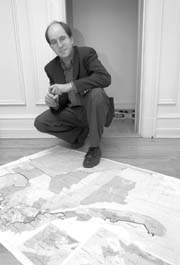
| ||
 | ||
 Richard Janda PHOTO: OWEN EGAN |
Redrawing the map
|
PATRICK McDONAGH | Richard Janda is lamenting the state of his office. "It was tidy last week, but now..." He shakes his head disconsolately at the small mountains of papers sliding into one another like a high-school geography project.
But Janda, a law professor, has been applying himself to another potentially messy situation lately: how to manage the possibility of Quebec's secession from Canada, with the numerous problems that transition would imply. The result of his efforts is a book, La Double Indépendance, launched today, and a web page (complete with cyber-poll) of the same name. "A lot of partisans have written about Quebec's future, explaining why sovereignty is good or bad," Janda notes in response to the inevitable question, "Why do we need another book on the sovereignty issue?" "But partisan writing is often polemical and somewhat over-heated." For Janda, in contrast, the keywords ought to be "clear" and "level-headed." "I wanted to write as a scholar looking at the problem of the transition to sovereignty as a matter of institutional reorganization, examining perils to consider without taking sides." A simple glance over the contents of La Double Indépendance suggests that Janda's work is distinct from the pack. He emphasizes demographic information, and draws on a range of historical examples of separation, from the "méthode dure" of West Virginia to the more recent "méthode douce" of the Swiss canton of Jure. There is much to consider, he stresses. "Currency, citizenship, the division of debt and assets of the public sector, the judiciary, the police force and correctional services, pension funds -- these are complex issues, that can be solved, but only with a serious and level-headed analysis," says the director of McGill's Centre for the Study of Regulated Industries. And, he adds, the sooner people begin to think about the issues, the better for everyone. A majority of Quebec ridings voted in favour of sovereignty in the last referendum, and are likely to re-elect a Parti Québécois government committed to another referendum. In Janda's view, the fact that support for sovereignty in Quebec is clearly delineated along regional lines argues in favour of partition, but defined by a set of cascading referendums of the sort used when Jure sought to establish itself as an independent canton in the Swiss federation in the 1970s. There, notes Janda, the north of Jure was strongly indépendantiste; the south wished to remain part of the canton of Bern. When the majority of the north voted in favour of separation, the south was given a second option in a subsequent referendum -- to join the north in a newly independent canton, or to align themselves with Bern. They chose the latter. Border towns were given a third referendum to determine which side of the border they would be on. The process was lengthy -- border referenda are still taking place -- but is an example of participatory democracy that has respected the wishes of citizens. Janda suggests a similar option for Quebec. The 1995 referendum -- the "third period" in Jacques Parizeau's hockey analogy -- ended in a virtual tie. The upcoming provincial election will determine if we are going into overtime, and, says Janda, the "oui" contingent has the home-ice advantage. "We've been told by one half of the Quebec electorate that they don't believe in the Canadian constitutional order. It seems equitable that they should determine the next step." What might this next step look like? In the example he gives in his book, Janda suggests that if 70 contiguous ridings vote for sovereignty, then that region should have the right to declare itself sovereign (had these conditions applied in the 1995 referendum, much of Quebec would already be independent). Those regions voting "non" would have the option of choosing to join a sovereign Quebec or remaining a part of Canada in a second referendum. "In a way, it's a no-lose situation," explains Janda. It is, however, likely to be a contentious plan both to federalists, who thoroughly oppose separation, and Quebec nationalists, who oppose partition. The issue has assumed prominence on Janda's cyber-poll web page. The page allows visitors to vote in a mock election; at the time of writing, the PQ is well ahead. The page also includes a discussion section. According to Janda, the three main points brought up have been language, the attention paid to aboriginal communities in Janda's book (which is excerpted on the web page), and the issue of partition. Lately, partition has dominated. "But the discussion has been quite sophisticated," he says, observing wryly that most discussions of this topic tend to degenerate into name-calling. "I'm trying to engage people at a substantive level." A visit to the web site suggests that he is succeeding; people are getting engaged. As the interview comes to an end, Janda prepares to pen a response to Jean Paré, editor of l'Actualité, who has written about Janda's plan. "I'm not convinced that the Quebec press will pick this up," he says. "It can be very difficult to get them to pay attention to someone not yet anointed as an accepted commentator on the political scene." But if early responses are any indication, Janda may find himself before the microphone with increasing regularity. He may have a wait before finding the time to tidy his office again.
|
|
| |||||